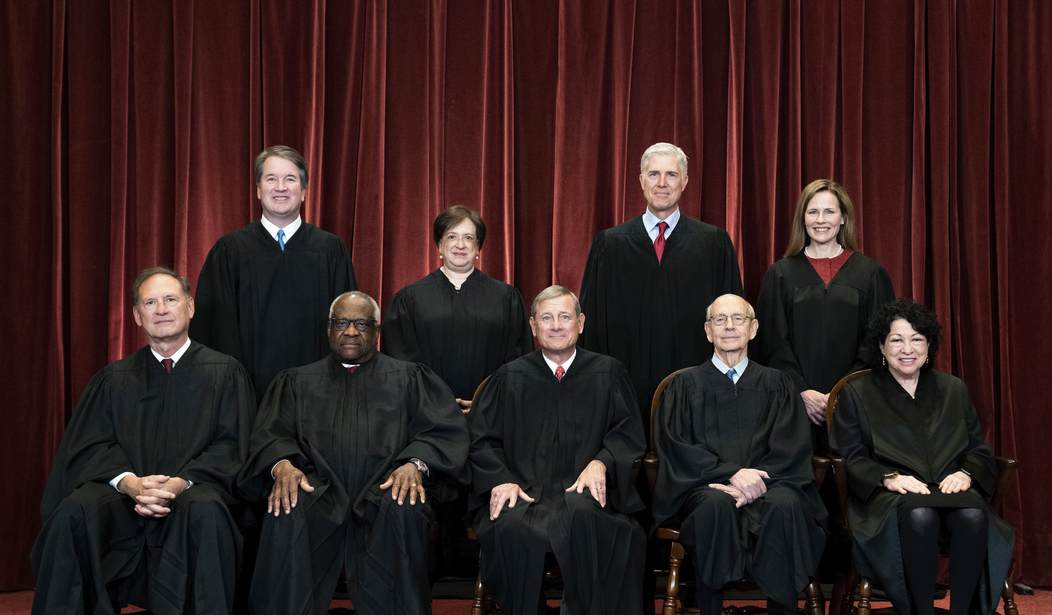In late January of this year, I was live on Fox News as reports emerged that Supreme Court Associate Justice Stephen Breyer would retire at the end of this term. Within minutes, I recalled on air that President Biden had promised to select a black woman in the event of such an opening, which narrowed down the field of potential nominees quite considerably. And due to the dynamics of what was about to unfold, I made a few other predictions in a Townhall analysis as well. Let's revisit them, starting with my thesis:
(1) "I suspect the Breyer replacement process will be a relatively low octane affair that may well move forward fairly smoothly and somewhat predictably." The stakes were low, as far as these things go, I reasoned – given the reality that the balance of the Court would remain unchanged, with one progressive replacing another. And despite some sniping and outrage on both sides – much of which felt synthetic, based on dubious to outright laughable assertions – the drama has indeed been rather low.
(2) I predicted that the likeliest nominee would be...Judge Ketanji Brown Jackson:
The president campaigned on the promise of nominating a black woman if a Supreme Court vacancy arose during his term. This was an unseemly, reductive, identity-obsessed pledge – but it was a base play. The base is fixated on such things. And with that base furious with the party lately (on BBB, "voting rights" and the filibuster, etc.), this is about as clean a win as Biden is likely to get this year. So he's going to serve up the sort of nominee he promised, the left will get to feel good about how "progressive" they are, and the nominee will get confirmed...If I had to bet on the identity of the nominee, I might put my money on this woman [Ketanji Brown Jackson] –- who was a Breyer clerk, and who was recently installed on the DC Circuit Court in a bipartisan vote. Shades of the Kavanaugh and ACB paths, combined.
(3) I also laid out why I thought it was very likely that all 50 Democrats would line up to support Biden's nominee, with very little heartburn or intrigue along the way:
Democratic moderates Joe Manchin and Kyrsten Sinema have every reason to vote with their party this time. Both have supported Biden's judicial nominees as a matter of course, and this is an easy way to tamp down some of the base's anger that's been directed at them so virulently for months on end. It's a layup: A chance to say, see, we're part of the team – in a high profile, but low stakes setting. No-brainer.
Recommended
Manchin, the upper chamber Democrat most prone to buck his party's leadership in significant ways, announced his support for KBJ last month, with plenty of time to spare. The confirmation effectively became a fait accompli at that point, based on the simple Senate math. The only real remaining question was how many Republicans would cross the aisle and vote to confirm the nominee. Before Jackson was even named, I applied some critical thinking to this analysis:
Some Republican moderates will likely seek to burnish their cross-partisan credentials by voting in favor of a qualified nominee with whom they have ideological differences, especially given the aforementioned low stakes. Susan Collins, I'll note, has never voted against a Democratic president's SCOTUS nominee. She touted that point in announcing her courageous pro-Kavanaugh vote in 2018. She'll want to emphasize that point again here, I'd guess...I put the over/under on "yes" votes on this yet-unnamed nominee at 52. And I might take the over, depending on how the hearings go. That may rankle some conservatives, but it's my analysis of what's going to happen.
Ahead of this week's looming final floor vote, three Republicans have publicly announced their intention to support Jackson's confirmation, which would put the final number of anticipated ayes at 53. Pegging the over/under at 52, and leaning toward slightly taking the over, is looking like a pretty strong prediction, based on an accurate reading of the relevant political dynamics. I don't make a lot of predictions, despite analyzing and commenting on politics on a daily basis. When I get things wrong, I admit to it. On this one, I got it right. Things might somehow shift in the next 24-48 hours, but that seems unlikely, and this key preview vote (basically a proxy for what's next) went exactly as expected:
By a bipartisan vote of 53-47, the Senate has forced the nomination of Judge Ketanji Brown Jackson out of the Judiciary Committee — putting the judge on track for final confirmation by week's end. https://t.co/nMjnDwvqek
— ABC News (@ABC) April 5, 2022
By a bipartisan vote of 53-47, the Senate has forced the nomination of Judge Ketanji Brown Jackson out of the Judiciary Committee -- putting the judge on track for final confirmation by week's end. GOP Sens. Lisa Murkowski of Alaska, Mitt Romney of Utah and Susan Collins of Maine voted with Democrats. All three Republicans will also support Jackson when it comes time to vote on final confirmation...the Senate Judiciary Committee deadlocked along party lines in an 11-11 vote Monday on whether to send Jackson's nomination to the full Senate...The tie vote forced Senate Majority Leader Chuck Schumer to file a discharge motion to bring the nomination before the full Senate in order to get it out of committee.
For what it's worth, I was not remotely surprised by Susan Collins' decision, for reasons laid out above. Murkowski was slightly less predictable because she's in-cycle right now, though a new voting system in Alaska makes primary challenges less potent (she also once won a statewide write-in campaign after losing a primary). Murkowski opposed Kavanaugh's confirmation (for very weak reasons, in my opinion), but voted in favor of Amy Coney Barrett. She does her own thing. Romney's choice here is also on-brand, which can be an admirable feature or a frustrating bug, depending on the day. I think it's fair to ask why he saw fit to oppose Jackson's nomination to a lower court, only to be persuaded that she should have a lifetime seat on the Supreme Court. That seems like an odd sequence of judgments. But my overall reaction to his pro-confirmation statement released Monday amounts to a bit of a cold take:
Romney’s most important decision on this front was to agree to move forward on RBG’s replacement & to support ACB’s confirmation. (Susan Collins, another announced KBJ GOP aye vote, was also a crucial MVP of the Kavanaugh confirmation). I’m fine with it… (2/3)
— Guy Benson (@guypbenson) April 5, 2022
I added that "my actual issue with Mitt these days has been his decision thus far not to support his friend and colleague Mike Lee for re-election. Utah has a strong Senate delegation, and Romney should do his part to maintain the pairing, in my opinion. Lee has stood up for him in a few tough spots, too." I realize that most conservatives will disagree with me on the former view, and that's okay. Sen. Tim Scott's "no" vote, just like Sen. Ben Sasse's, is completely defensible on the merits – especially considering how modern Democrats have been fighting these battles:
Tim Scott, lone Black GOP senator and one of just three African-American senators, says of Jackson: “The historic nature of Judge Jackson’s nomination reinforces the progress our country has made. However, ideology must be the determining factor—not identity” on SCOTUS. He’s a NO
— Manu Raju (@mkraju) April 4, 2022
With votes from Collins, Murkowski, and Romney, KBJ will have as many R votes as Gorsuch had D votes—and more than Kavanaugh (1) and Barrett (0) had.
— Ed Whelan (@EdWhelanEPPC) April 4, 2022
I just think that there will come a day when conservatives will value having figures in the mold of Manchin/Romney/Collins in the United States Senate ahead of a consequential vote.

























Join the conversation as a VIP Member